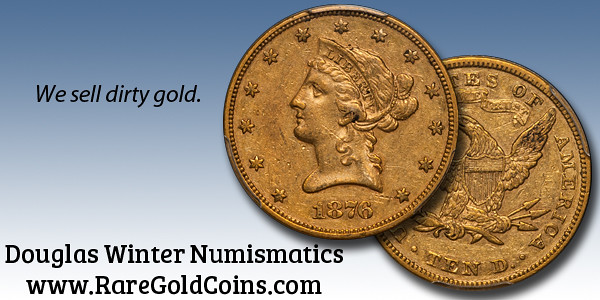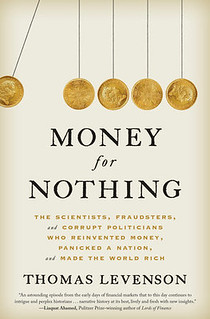
PREV ARTICLE
NEXT ARTICLE
FULL ISSUE
PREV FULL ISSUE
NEW BOOK: MONEY FOR NOTHINGAnother new book on the creation and nature of money was reviewed in the Wall Street Journal this week. Here's an excerpt. -Editor
Yes indeed, suggests Thomas Levenson, author of the aptly titled “Money for Nothing.” Though it was war that led to the founding of the Bank of England, and avarice (and bribery, too) that drove the South Sea Co. forward, the unlovely back stories, Mr. Levenson says, can’t efface the contributions of these financial experiments to the progress of the world. Mr. Levenson, a professor of science writing at the Massachusetts Institute of Technology, interweaves the story of the rise of mathematics and astronomy with the rise of bankers and actuaries and stock promoters. He traces the evolution of the idea of money to the habits of mind that brought us calculus and the art of surveying and the theories of gravity and optics. And he frames this vivid narrative around the century-long wars between France and Britain that culminated in the Battle of Waterloo in 1815. Opening with sketches of the lives and ideas of such luminaries as Isaac Newton and Edmond Halley (he of comet fame), Mr. Levenson pauses to describe the reform of the English coinage and to ponder the nature of money itself. This last topic could hardly be timelier now that the Federal Reserve is producing more money than even Newton, hyper-efficient warden of the Royal Mint in the late 1600s—and “perhaps the greatest genius in the history of the world,” by Mr. Levenson’s reckoning—was equipped to imagine. Intellectual preliminaries out of the way, the author homes in on the rise and fall of the South Sea Co. and the parallel cross-channel boom and bust of the Mississippi Co. Each project started with an exciting new idea. Each commanded the imprimatur of the state. Each enriched some, enchanted many others and, finally, ruined almost as many as it had enriched. Each was a bubble, but each opened minds to the possibilities of financial invention. Meanwhile, across the English Channel, the brilliant John Law, a Scotsman living in Paris who would teach the French the meaning of the word inflation, was doing the South Sea Co. one better. He, too, undertook to relieve the government of its burdensome debts by exchanging its IOUs for shares of stock, in this case, shares in Law’s very own “banque.” That ambition achieved, Law sold his Banque Générale to the French state. The notes of the renamed Banque Royale now circulated as legal tender. Better still, from Law’s vantage point, his scrip displaced gold and silver; 18th-century France, anticipating modern America, adopted a pure paper monetary standard. But comeuppance followed swiftly, as the clouds of new bank notes created the inflation that collapsed the share price of the Mississippi Co. (so named for the monopoly that Law’s creation enjoyed in trading with France’s Louisiana Territory). The monetary magician presently took flight, “stuffed into a borrowed coach,” as Mr. Levenson puts it, without a sou in his pocket and fearing for his life. Even so, Mr. Levenson contends, the fugitive from the consequences of money-printing made his constructive mark: “As deeply as any contemporary John Law both recognized and demonstrated that money didn’t have to be real. . . . Gold or silver did not possess some unique property that gave them significance—value—beyond what the market said it had.” Hence was born, in the author’s telling, the volatile but indispensable “mathematics of credit” by which we live now.
To read the complete article, see:
For more information, or to order, see:

Wayne Homren, Editor The Numismatic Bibliomania Society is a non-profit organization promoting numismatic literature. See our web site at coinbooks.org. To submit items for publication in The E-Sylum, write to the Editor at this address: whomren@gmail.com To subscribe go to: https://my.binhost.com/lists/listinfo/esylum All Rights Reserved. NBS Home Page Contact the NBS webmaster 
|
